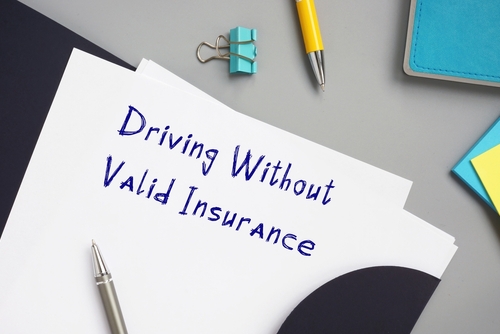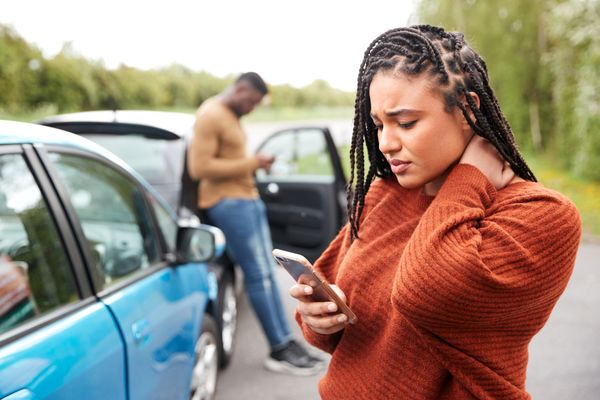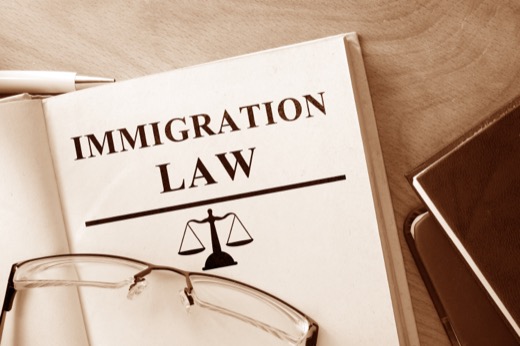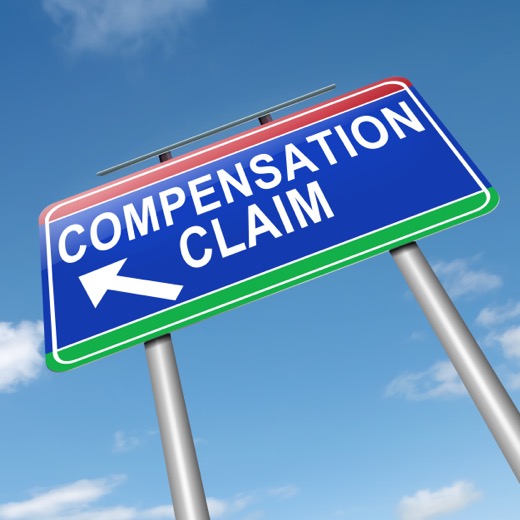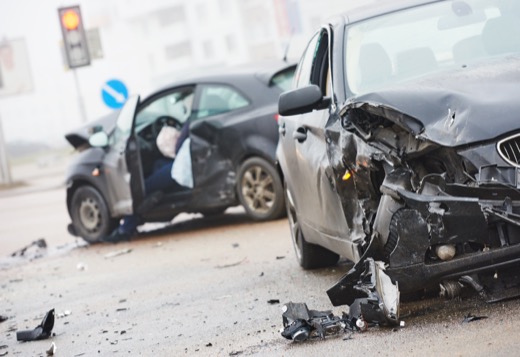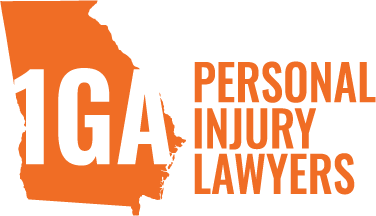Your Options After an Accident Without Insurance: How 1Georgia Injury Lawyers Can Help
Navigating the aftermath of a car accident can be daunting, especially if you find yourself without insurance. What happens if you have no insurance but the other driver was at fault? The good news is that you still have options. Our team of experienced Georgia car accident lawyers at 1Georgia Injury Lawyers is well-versed in the complexities of motor vehicle accident cases, particularly those involving uninsured drivers.
With a deep understanding of personal injury law and insurance claims, we are equipped to guide you through the legal maze, ensuring you understand your rights and options for seeking compensation. Whether it’s filing a claim against the at-fault driver’s insurance or pursuing other avenues of recovery, an Atlanta car accident attorney will advocate for your best interests.
Trust our expertise to help you achieve the best possible outcome, even in challenging situations. Let 1Georgia Injury Lawyers help you navigate your path toward compensation, even if you’re uninsured and the other driver is at fault.
Understanding Your Rights in a Car Accident
If you’ve been involved in a car accident in Atlanta, it’s essential to understand your rights and the steps you can take to protect them. As an Atlanta car accident lawyer, we can help you navigate the complex process of filing a claim and ensure you receive fair compensation for your damages and injuries.
Entitlement to Compensation for Damages and Injuries
In Georgia, you are entitled to compensation for damages and injuries sustained in a car accident, including medical expenses, lost wages, property damage, pain and suffering, and emotional distress. An experienced car accident lawyer in Atlanta can help you determine the full extent of your damages and fight for the compensation you deserve. Whether it’s negotiating with insurance companies or representing you in court, having a knowledgeable accident lawyer in Atlanta can make a significant difference in the outcome of your case.
Role of the Other Driver’s Insurance in Covering Expenses
The other driver’s insurance company is responsible for covering expenses related to the accident, including medical bills, lost wages, and property damage. However, insurance companies often try to minimize payouts, which is why it’s crucial to have an Atlanta car accident lawyer on your side to negotiate with the insurance company and ensure you receive fair compensation. An experienced car accident lawyer can help you gather the necessary evidence, handle communications with the insurance company, and advocate for your best interests throughout the claims process.
Legal Consequences of Driving Without Insurance
Driving without insurance can lead to serious legal consequences. Understanding these penalties is crucial for anyone involved in a car accident.
Potential Fines and Penalties
If you are caught driving without insurance, you may face significant fines. These fines can vary by state but often range from a few hundred to several thousand dollars. Additionally, your state may impose administrative fees or surcharges. Some states may even require you to pay a reinstatement fee if your license is suspended due to lack of insurance.
License and Registration Suspension
In many states, driving without insurance can result in the suspension of your driver’s license and vehicle registration. This means you may not legally drive until you provide proof of insurance. The duration of the suspension varies depending on state laws and your driving history. Reinstating your license often requires payment of fines and proof of insurance, which can complicate your situation further.
Understanding these legal consequences is essential. If you find yourself in an accident without insurance, it is important to consult with a knowledgeable auto accident attorney. They can help you navigate the legal landscape and explore your options for seeking compensation.
Options for Seeking Compensation When You’re Uninsured
If you have no insurance but the other driver is at fault, you still have options for seeking compensation through an Atlanta car accident claim. Understanding these options is crucial for your financial recovery.
Filing a Personal Injury Lawsuit Against the At-Fault Driver
You can file a car accident injury claim against the driver who caused the accident. This legal action allows you to seek compensation for your medical bills, lost wages, and pain and suffering. You will need to prove that the other driver was negligent and that their actions directly led to your injuries.
Keep in mind that even if you are uninsured, you can still pursue this route. However, you must be prepared to handle the legal process, which can be complex. An experienced car accident attorney can assist you in gathering evidence and building a strong case.
Challenges of Collecting Compensation from an Uninsured Individual
Collecting compensation from the at-fault driver can present challenges, especially if they are uninsured or lack sufficient assets. If the other driver does not have the financial means to pay a judgment, you may face difficulties in recovering the amount awarded by the court.
Additionally, if the at-fault driver contests your claim, it may prolong the legal process. You might also encounter issues related to their liability insurance, which can complicate your case further.
To improve your chances of recovery, it is essential to work with a knowledgeable attorney. They can help you navigate these challenges and explore additional avenues for compensation, such as pursuing any available uninsured motorist coverage or other potential sources of recovery.
Importance of Uninsured/Underinsured Motorist Coverage
Uninsured/underinsured motorist (UM/UIM) coverage is a critical component of auto insurance. It protects you when the other driver is at fault but lacks sufficient insurance to cover your damages, which is common in many auto accidents. Understanding this coverage can save you from significant financial losses.
How It Protects You Even When You’re Not at Fault
If you are involved in an accident with an uninsured driver, UM/UIM coverage steps in to cover your medical bills, lost wages, and other damages. This means you can pursue compensation without relying solely on the at-fault driver’s insurance. For example, if another driver causes an accident and does not have insurance, your UM coverage can help pay for your injuries and property damage.
Limitations of Coverage
While UM/UIM coverage is beneficial, it does have limitations. First, there may be a cap on the total amount you can claim, which varies by state and policy. Additionally, some policies may not cover certain types of damages, such as punitive damages or non-economic damages. It’s essential to review your policy details to understand these limitations fully.
In summary, having uninsured/underinsured motorist coverage is vital for protecting yourself in case of an accident with an uninsured driver. It provides a safety net that can help you recover from financial losses, ensuring you have support even in challenging circumstances.
Steps to Take Immediately After an Accident with an Insured At-Fault Driver
Experiencing a car accident can be overwhelming. If you find yourself in this situation without insurance, it’s vital to act carefully to build a strong car accident case. Here are the key steps to take immediately after the accident.
Gathering Evidence and Information at the Scene
Collecting evidence is crucial for your case. Start by exchanging information with the other driver. Obtain their name, contact details, and insurance information. Take photos of the accident scene, including vehicle damage, road conditions, and any visible injuries. This documentation can support your claim later.
Additionally, gather contact information from any witnesses. Their statements may help establish fault. If possible, make notes about the accident’s circumstances while the details are fresh in your mind.
Reporting the Accident to Authorities
Next, report the accident to local law enforcement. In many states, you are required to notify the police if there are injuries or significant property damage. The police will create an official report, which can be valuable for your case. Ensure you request a copy of this report for your records.
If you are in a no-fault state, this report may help you understand your options for compensation, even if you lack insurance. Always cooperate with law enforcement but remember your right to remain silent about details that could incriminate you.
Taking these steps can help you navigate the aftermath of an accident more effectively, even without insurance. Proper documentation and reporting can aid in your pursuit of compensation from the at-fault driver.
Dealing with the Other Driver’s Insurance Company
Dealing with the other driver’s insurance company can be challenging, especially if you’re not familiar with the process. As an Atlanta car accident lawyer, we can help you navigate the process and ensure you receive fair compensation for your damages and injuries.
Challenges in Claims and Importance of Legal Consultation
Insurance companies often try to minimize payouts, which can lead to challenges in claims. An experienced car accident lawyer in Atlanta can help you navigate these challenges and ensure you receive fair compensation for your damages and injuries. It’s essential to seek legal consultation as soon as possible after a car accident to protect your rights and ensure you receive the compensation you deserve.
By understanding your rights in a car accident and seeking legal help from an experienced Atlanta car accident lawyer, you can ensure you receive fair compensation for your damages and injuries. Our team of lawyers at Rafi, Brown, and Stokes is dedicated to helping car accident victims get the compensation they deserve. Contact us today for a free consultation.
Potential Impact on Your Ability to Recover Damages
When you do not have insurance after an accident, your ability to recover damages may be significantly affected. The lack of insurance can lead to limitations on your car accident claim and a possible reduction in settlement amounts.
Limitations on Compensation Due to Lack of Insurance
If you are involved in a car accident and do not have insurance, you may face challenges in recovering compensation. Many states have laws that limit the amount you can claim if you are uninsured. This means that even if the other driver is at fault, your lack of insurance can limit your recovery options. Insurance companies often view uninsured drivers as less credible, which can affect the negotiations for your claim.
Possible Reduction in Settlement Amounts
Your lack of insurance can also lead to a reduced settlement amount. Insurance companies may argue that you share some responsibility for the accident because you were driving without coverage. This can result in a lower offer than what you might receive if you had insurance. Additionally, if the at-fault driver’s insurance company knows you are uninsured, they may take advantage of this situation, offering a settlement that is less than fair.
Understanding these impacts is crucial. If you find yourself in this situation, it is wise to consult with an experienced car accident attorney. They can help you navigate the complexities of your case and work to secure the best possible outcome, even in challenging circumstances.
State-Specific Laws Regarding Uninsured Drivers
Each state has its own laws regarding uninsured drivers, which can significantly affect your situation after an accident. Understanding these variations is crucial for navigating the aftermath of a car accident without insurance.
Variations in Penalties and Requirements Across States
States impose different penalties for driving without insurance. Some states may impose hefty fines, while others may require community service or mandatory insurance education courses. For example:
- California: Driving without insurance can lead to fines, vehicle impoundment, and license suspension.
- Florida: Penalties include fines and points on your driving record, which can increase insurance rates later.
- Texas: Fines can reach up to $350, and repeat offenders may face higher penalties.
In addition to these penalties, states may have different requirements for drivers involved in accidents. Some states may require proof of financial responsibility, which can include insurance or other forms of security.
No-Fault vs. At-Fault State Distinctions
The distinction between no-fault and at-fault states plays a significant role in how car accidents in Atlanta are handled.
- No-Fault States: In these states, each driver’s insurance covers their own medical expenses and damages, regardless of who caused the accident. However, if you are uninsured, you may not be able to collect any compensation for your injuries or damages. States like New York and Michigan follow this model.
- At-Fault States: In at-fault states, the driver responsible for the accident pays for damages. If the other driver was at fault, you may have the option to file a claim against their insurance. However, being uninsured may complicate this process, and you might face challenges in recovering damages.
Understanding your state’s laws can help you navigate the aftermath of an accident more effectively. If you find yourself in this situation, consulting with a car accident attorney can provide clarity and guidance on how to proceed.
Long-Term Financial Implications
Driving without insurance can lead to significant long-term financial consequences. Understanding these implications is essential for making informed decisions after an accident. In summary, driving without insurance can lead to long-lasting financial challenges. It is crucial to understand these implications and consult with an auto accident lawyer to avoid further complications down the road.
Difficulty Obtaining Future Insurance Coverage
If you have been involved in a car accident without insurance, future insurance coverage may become difficult to secure. Insurance companies often view uninsured drivers as high-risk. This perception can lead to:
- Higher premiums: You may face increased rates when applying for new insurance policies.
- Denial of coverage: Some insurers may refuse to provide coverage altogether, leaving you without options.
- Limited choices: You may have fewer companies willing to insure you, restricting your ability to find affordable rates.
Potential Impact on Credit Score
An accident without insurance can also affect your credit score. If the at-fault driver or their insurance company pursues you for damages, it could lead to:
- Unpaid bills: If you cannot pay for damages, the creditor may report this to credit bureaus, harming your credit score.
- Collections: If the debt goes to collections, it can significantly impact your financial standing.
- Difficulty securing loans: A lower credit score can make it challenging to secure loans or credit in the future, affecting your ability to make large purchases like a home or car.
In summary, driving without insurance can lead to long-lasting financial challenges. It is crucial to understand these implications to avoid further complications down the road.
Alternative Dispute Resolution Options
After a car accident, especially if you lack insurance, exploring alternative dispute resolution (ADR) options can be beneficial. ADR methods like mediation and arbitration can provide a way to resolve disputes without going to court. These processes can be less formal, quicker, and often less expensive than traditional litigation.
Mediation or Arbitration Possibilities
Mediation involves a neutral third party who helps both sides discuss their issues and reach a mutual agreement. This process is voluntary and allows you to express your concerns while working toward a solution. Mediation can be particularly useful if both parties are willing to negotiate.
Arbitration, on the other hand, is more formal. An arbitrator hears both sides and makes a binding decision. This process can save time and resources compared to a court trial. However, it’s important to note that once an arbitrator makes a decision, it is usually final.
Negotiating Directly with the At-Fault Driver’s Insurance Company
If the other driver is at fault, you can negotiate directly with their insurance company. Present your case clearly, including evidence from the accident scene, medical records, and any other relevant documentation. Be prepared to discuss the extent of your injuries and damages.
Negotiation can sometimes lead to a fair settlement without the need for mediation or arbitration. However, be cautious. Insurance companies often aim to minimize payouts. Having a clear understanding of your rights and potential compensation can strengthen your position.
Involving a legal professional can enhance your negotiation efforts. Experienced Atlanta car accident attorneys can help you navigate these discussions, ensuring you pursue the compensation you deserve, even in the absence of your own insurance.
Importance of Legal Representation
After a car accident, especially if you lack insurance, seeking legal representation from personal injury attorneys is crucial. An experienced car accident attorney can provide significant advantages in your case.
Benefits of Hiring an Experienced Car Accident Attorney
- Knowledge of Personal Injury Law: A skilled attorney understands the nuances of personal injury law. They can explain your rights and the legal options available to you. This knowledge is vital in navigating your case effectively.
- Negotiation Skills: Attorneys are trained negotiators. They can handle discussions with the at-fault driver’s insurance company. Their experience helps in securing a fair settlement that reflects the true extent of your damages.
- Case Evaluation: An attorney can assess your case’s strengths and weaknesses. They will evaluate the evidence, such as police reports and witness statements, to build a solid case on your behalf.
- Representation in Court: If your case goes to trial, having a lawyer who knows the court system is essential. They will represent you, present evidence, and argue your case effectively.
How a Lawyer Can Help Navigate Complex Insurance Issues
- Understanding Insurance Policies: Insurance policies can be complicated. A lawyer can help you understand the terms and conditions, including any relevant exclusions or limitations.
- Filing Claims: An attorney can assist in filing claims correctly and on time. They ensure that all necessary documentation is submitted, reducing the risk of delays or denials.
- Dealing with Uninsured Drivers: If the other driver is uninsured, a lawyer can help you explore your options. They can guide you through filing a personal injury lawsuit against the at-fault driver, even if they lack insurance.
- Maximizing Compensation: A lawyer aims to maximize your compensation. They will calculate all potential damages, including medical expenses, lost wages, and pain and suffering. Their goal is to ensure you receive what you deserve.
In summary, hiring an experienced car accident attorney is vital, especially if you are uninsured. They provide the expertise needed to navigate the complexities of your case, ensuring you are well-represented and your rights are protected.
Prevention Strategies
Maintaining proper insurance coverage is essential for all drivers. It protects you financially in case of an accident. Here are some strategies to ensure you stay insured:
Importance of Maintaining Proper Insurance Coverage
Having car insurance is not just a legal requirement; it is a financial safety net. Insurance covers medical bills, property damage, and legal fees in the event of an accident. Without insurance, you may face significant out-of-pocket expenses. This can lead to financial strain or debt if you are involved in a car accident.
Understanding Minimum Insurance Requirements in Your State
Each state has different minimum insurance requirements. Understanding these laws is crucial. Here are a few key points to consider:
- Liability Insurance: Most states require liability insurance, which covers damages to others if you are at fault.
- Uninsured Motorist Coverage: This protects you if you are in an accident with an uninsured driver. Some states require this coverage.
- Personal Injury Protection (PIP): Some states mandate PIP, which covers your medical expenses regardless of fault.
Check your state’s Department of Motor Vehicles (DMV) or insurance department website for specific requirements. Make sure your policy meets or exceeds these minimums to avoid penalties and ensure you have adequate protection on the road.
Contact Us
If you’ve been in an accident and are unsure of your rights or options, don’t hesitate to reach out to us. Contact 1Georgia Injury Lawyers today for a free consultation. We’re here to help you understand your case and work toward securing the compensation you deserve. Contact us to schedule an appointment 678-635-9939
